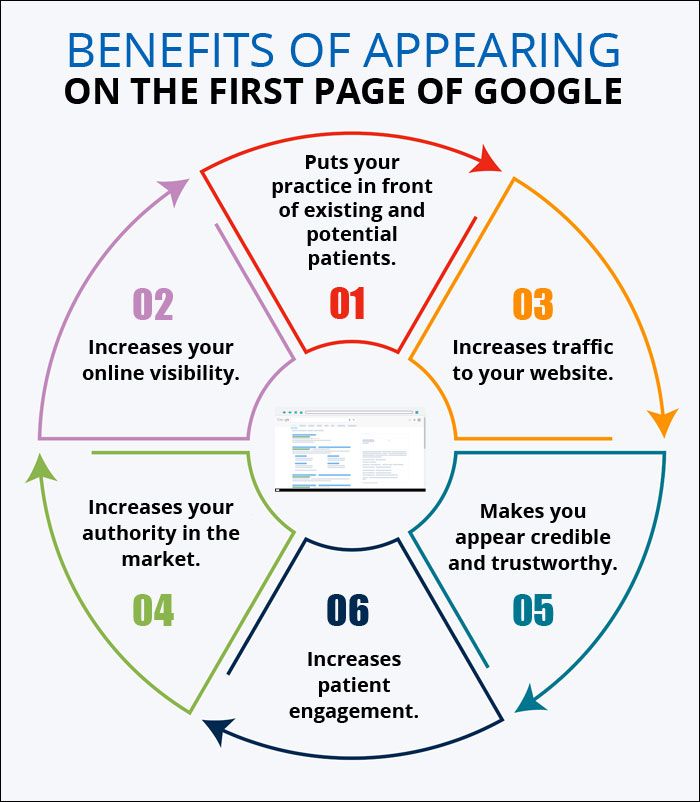Get your website to the top of Google rankings-and stay there
Studies indicate that 75 percent of online visitors never search beyond the first page of Google when looking for a healthcare practice or physician in their area. If your website does not appear on the first page of search results, you need to work harder.

test
Thousands of medical practices are competing for higher rankings in search engines results. A 2014 Google study found a 71 percent click-through rate (CTR) for websites on page one of search engine results while pages two and three have a combined CTR of 6 percent. This means that appearing on the second page of search results is a lost battle. Worse, if your healthcare website appears further than the second page, it does not even exist for potential patients.
If your website is not at the top of search results, you need to devise a strategy to rise through the ranks. There are two ways to appear on the first two pages of Google search results: organic search or paid search results, known as Google AdWords.
Organic results are the websites that Google considers the best in a given industry or market. More than 70 percent of searchers click on organic results, according to research. Additional studies have revealed the first position in the organic search attracts around 33 percent of the total traffic, the second position gets 18 percent, and it only decreases from there. According to another study, the top three organic results on the first page of search engine results attract 61 percent of the traffic, traffic that lower ranking websites miss out on.
Compared to organic search, paid ads are less reliable, but they offer a great opportunity for medical practices that are unable to rank high in organic searches. When you pay to have your healthcare website listed at the top, you appear as one of the top three results on the Google search page. These are the fixed placements for paid results. However, 70 percent to 80 percent of online visitors tend to ignore paid ads and choose to click only on organic results.
It is important to make sure that every aspect of your online marketing strategy is aimed at improving your website’s organic search results. Whether it is through optimizing keywords or targeting your blog posts, your aim should be to expand and enhance your practice’s online presence. The more you optimize your website for search engine optimization (SEO), the more potential patients will visit it and the higher it will rank on search engine results.
A strong SEO strategy starts with identifying and including the most relevant keywords in your website content. This is easier said than done because simply mentioning the types of services your practice offers may not be sufficient. It is important to invest time and money in identifying the relevant keywords that will get your practice website to the top of search results. This process involves researching your, local market, business goals, competitors, and what strategies your competitors are deploying.

Here are two initial ways to boost your search results:
- Make sure Google indexes your healthcare website. You can check this by typing your website, www.yourdomain.com, into the Google search box. If you see your website’s pages, this means Google has indexed your website and will continue to crawl it for updates. However, if your practice’s website does not appear in search results, you must get it indexed.
- Google only displays websites that are relevant to the keywords being searched, so your website content must be related to relevant keywords. For example, a physician’s practice in Phoenix could include what services are offered (e.g., pediatrics, primary care, family medicine), location (e.g., the neighborhood, suburb, zip code), and what insurance providers are accepted. These should be included in text throughout the website as well as alternate text for pictures and meta content in your website’s HTML coding.
A mix of factors can help you secure a higher Google ranking, and the more you do of the following the better of your practice’s website, and practice, will be.
Include the right keywords
Once you have identified the suitable keywords, it is important to incorporate them effectively into your marketing strategy. Every webpage and blog post should include those keywords in your content so search engines can find your practice. Hashtagging those keywords in social media posts can also improve your findability on those platforms, increase your audience, and cement your status as a leading medical expert. As an added bonus, public social media accounts can also find their way into Google search results.
Post fresh and genuine content
Google’s algorithm prefers websites with original content. In order to effectively implement your SEO strategy, it is essential to create and share engaging content that will help connect your medical practice to its target audience. The Google algorithm is intelligent enough to identify stuffed keywords and duplicate content. This means you cannot overload your site with keywords or copy content from other websites and trick the search engines into giving your healthcare website a better ranking.
SEO boosts your digital marketing efforts
SEO is an integral part of your digital healthcare marketing plan. All of your attempts should be aimed at enhancing your medical practice’s digital footprint, including your website’s layout, social media posts, and the nature and frequency of your blogs.
Personalized digital marketing is the most talked about search engine ranking factor in 2018. If you are a healthcare marketer or running a medical practice, you will need to localize your website’s content to a specific audience group. You will also need to analyze competitors, who will likely be implementing best-in-class SEO strategies to bolster their search rankings, too. It is one thing to attract potential patients to your website; it is another thing to convert leads into paying patients.
Alex Mangrolia has been in digital marketing for more than 15 years to drive new profitable growth as well as techniques to boost website traffic and leads. He works as director of marketing and product development for Practice Builders, a healthcare marketing and consulting firm for healthcare practices, hospitals, and clinics. Learn more about Alex's capabilities at PracticeBuilders.com.